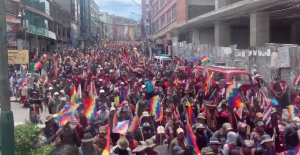 Nearly eight months after incumbent Bolivian president Evo Morales was ousted in a coup d’etat amid allegations of electoral fraud, The New York Times reports that the Organization of American States’ (OAS) claims of fraud in the 2019 general election “relied on incorrect data and inappropriate statistical techniques.”
Nearly eight months after incumbent Bolivian president Evo Morales was ousted in a coup d’etat amid allegations of electoral fraud, The New York Times reports that the Organization of American States’ (OAS) claims of fraud in the 2019 general election “relied on incorrect data and inappropriate statistical techniques.”
However, the new New York Times report makes no mention of the Center for Economic and Policy Research, which sounded the alarm on the OAS’s false claims in real time.
CEPR now notes: “On October 21, 2019, just one day after Bolivia’s election, the OAS denounced — without providing any evidence — a ‘drastic’ and ‘inexplicable’ change in the trend of the vote count following an interruption of the transmission of the election results. At the time, CEPR was quick to note that the data simply did not back up the OAS claims.” Despite CEPR’s documentation, the OAS claims were widely echoed through major media.
In February, findings by John Curiel and Jack R. Williams at MIT’s Election Data and Science Lab — contracted by CEPR to verify the numerical and statistical results of CEPR’s November 2019 study of the Bolivian election — were published by the Washington Post: “Bolivia dismissed its October elections as fraudulent. Our research found no reason to suspect fraud.” These findings also are unmentioned by the New York Times.
An in-depth report by CEPR issued in March addresses the claims that the OAS is now making. “For those paying close attention to the 2019 election, there was never any doubt that the OAS’ claims of fraud were bogus,” said CEPR Research Associate Jake Johnston, coauthor of an 82-page report on the Bolivian election and the OAS audit of that election. “Just days after the election, a high-level official inside the OAS privately acknowledged to me that there had been no ‘inexplicable’ change in the trend, yet the organization continued to repeat its false assertions for many months with little to no pushback or accountability.”
“The OAS bears responsibility for the significant deterioration of the human rights situation in Bolivia since Morales’s ouster,” CEPR Co-Director Mark Weisbrot said. He noted that this was not the first time the OAS had played a damaging role in an electoral crisis, citing the 2010 elections in Haiti as an example. “If the OAS and Secretary General Luis Almagro are allowed to get away with such politically driven falsification of their electoral observation results again, this threatens not only Bolivian democracy but the democracy of any country where the OAS may be involved in elections in the future.”
CEPR was a main source for the Institute for Public Accuracy after the 2019 Bolivian coup. See IPA news releases including: “Is the OAS Interfering in the Bolivian Election?” “Bolivia: What a Coup Looks Like” and “Bolivian Coup Targeting Indigenous People.”See piece by Gregory Shupak for FAIR in November, which criticized the New York Times and other major media for accepting the false OAS narrative when it most mattered: “Unpacking Media Propaganda About Bolivia’s Election.”
For interviews with CEPR specialists, contact:
Dan Beeton, beeton at cepr.net, @Dan_Beeton